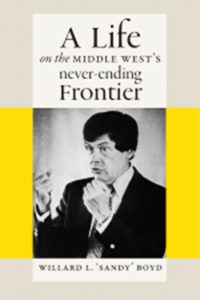Willard L. “Sandy” Boyd
Iowa City: University of Iowa Press, 2019
394 pages; hard cover; 22 b&w photos; $35
A Life on the Middle West’s Never Ending Frontier is a well-written and sometimes humorous and self-deprecating memoir by St. Paul native Willard L. “Sandy” Boyd. As the title suggests, Boyd’s life as a professor’s son, a young lawyer, a university administrator, president of two major institutions, and a respected leader in the world of philanthropy and service was carefully guided by traditional middle-western values. What makes this memoir different is Boyd seems to purposely avoid the word “I” when possible. Sure, the book highlights his very full life journey, but that journey deliberately pays tribute to hundreds of people, organizations, and institutions that collaborated with Boyd to make the world a better place than he and they found it.
To start, the memoir highlights the author’s early life. Twin Cities’ readers will enjoy his childhood anecdotes at 2227 Hillside Avenue in St. Anthony Park. Boyd learned lessons at Guttersen Grade School and Murray Junior High and shares stories about Kusterman’s Drug Store and cutting through the fairgrounds to catch the Saturday movies at Midtown Theater. In high school, World War II loomed in the background, and in 1945, following graduation and a few college courses at the U, Boyd joined the US Navy. Then it was back to school. He earned two law degrees and began working as a lawyer before Susan Kuehn—a writer/editor with the Minnesota Tribune—came along. Just after Boyd proposed and the couple began preparing for a comfortable life and careers in Minnesota, he got a call from Iowa.
The remainder of Boyd’s book focuses on his work from 1954 to the present day, including his dozen years as president of the University of Iowa and fifteen years at the helm of the Field Museum in Chicago. Throughout his career, he kept three important principles in focus: education, research, and service.
The author carefully details the histories of the university and the museum, while crediting those leaders who came before and after him. Readers, unless associated with these two institutions, might want to skim parts of some chapters. They are necessary in documenting important institutional histories, but the many names and detailed minutiae might not entice all readers.
That said, much of the book is hard to put down because of several seemingly insurmountable challenges. At the university, Boyd’s administration ran head-on into civil rights issues and threats to close the school temporarily, not to mention the day-to-day need to recruit the best professors, develop new and innovative research, and secure funding. He faced similar challenges at the museum: a push by American Indians for repatriation of museum collections, efforts to revitalize the museum and navigate controversial exhibitions, and the continuing need to recruit the best, enhance research, and secure funding—always funding!
Boyd plowed through the work, guided by several reminders:
- It’s people, not the structures, that matter.
- There’s no positivism in negativism. Be optimistic.
- The world is filled with others, as well as you. It belongs to everyone.
- Change is constant. Embrace it with enthusiasm.
In between all the work, Boyd focused on service—not only at the university and museum but also in his two “adopted” states and the country at large—serving on committees and boards too numerous to count.
In the end, this book is not just about Sandy Boyd. It’s also about everyone along the way who stood by this man on his journey and influenced his thinking, collaborated, shared, fought, mourned, inspired, and celebrated with him. Essentially, A Life on the Middle West’s Never-Ending Frontier is a remarkable thank you note—and a call-to-action to all of us to assemble a solid strategic plan and keep moving forward for the good of all people.
Meredith Cummings is the editor of Ramsey County History magazine and former editor of So It Goes: The Literary Journal of the Kurt Vonnegut Museum and Library.
